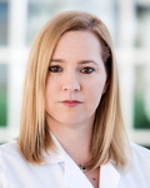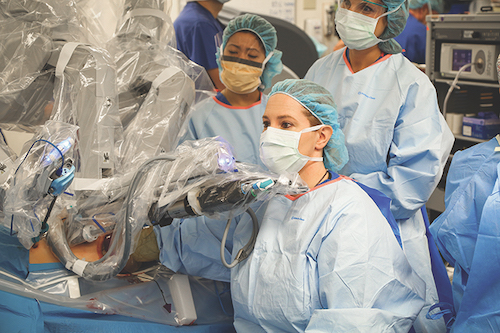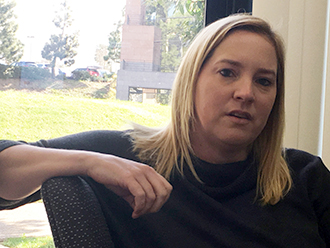Q & A with Kristin Mekeel
 Dr. Kristin Mekeel is Interim Chief of the Division of Hepatobiliary & Transplant Surgery, and Surgical Director of Kidney Transplantation. Her team performed 85 kidney transplants in 2017—the most since 2010. In this interview, she discusses organ allocation reforms; strategies for increasing the pool of available organs and what it’s like to be a woman in surgery.
Dr. Kristin Mekeel is Interim Chief of the Division of Hepatobiliary & Transplant Surgery, and Surgical Director of Kidney Transplantation. Her team performed 85 kidney transplants in 2017—the most since 2010. In this interview, she discusses organ allocation reforms; strategies for increasing the pool of available organs and what it’s like to be a woman in surgery.
March 8, 2018 | Interview by Lindsay Morgan
You grew up in Milwaukee, Wisconsin, which naturally makes me think of Laverne & Shirley.
And Happy Days. I grew up in a small suburb in Milwaukee. It’s a pretty city, right on Lake Michigan.
How did you get interested in medicine?
Initially I wanted to be a chef, and later, a journalist and a writer. But then I got to college and took a biology class and excelled. It was the first time it ever occurred to me that I could do something in science—and that I might actually enjoy it.
You went to medical school in Madison, then completed your general surgery residency at the University of Colorado, followed by a fellowship in organ transplantation and hepatobiliary surgery at the University of Florida. Why transplant?
I drank the Kool-Aid early—I got turned on to transplant in medical school. Within two days of my surgery rotation, I knew I wanted to be a surgeon. They were the smartest people in the hospital; they always knew what was going on, were always there to fix the problems. In my 3rd year of medical school, I did a transplant rotation, and just loved it. Flying on the planes, watching the organs reperfuse, all the medicine that went with it. I was hooked.

Of all of the specialties, transplant seems the most like science fiction—taking organs out of dead people and putting them into other people. That’s nuts.
It is. Just this past weekend I did a kidney transplant with a medical student who had never seen one before. We sowed the kidney in and it pinked up and started making urine. It was great to see it through his eyes—he walked out saying: that was the greatest thing I’ve ever seen, I want to be a surgeon. It’s good to remember that what we do on a daily basis, and what’s become normal to us, is actually amazing.
There’s a dearth of organs available for transplant in the United States. How does that play out here at UC San Diego?
Nationwide everybody is struggling with the lack of available organs for patients, especially in the high population settings of the East and West Coast. In California, it is a huge challenge. There’s a wide disparity across the United States in terms of the number of donors per capita and the burden of disease. If you’re blood type O or blood type B in California right now, you’re waiting 10-14 years for a kidney, on average. More broadly, there are over 100,000 people in the United States waiting for a kidney transplant, and about 20,000 in California.
What determines whether a patient can access an organ transplant?
We look at whether they are medically suitable, financially suitable, psychosocially suitable. Unfortunately, financial means play a role. Patients have to be insured to get an organ transplant as they have to have the ability to afford the immunosuppressant medications. If you don’t take the medications, you will lose that organ. We don’t have enough organs and we have to be good stewards of our precious resource.
Last year you were elected to the American Society of Transplant Surgeons PROACTOR (“providing better access to organs”) Task Force, which was established to come up with ways to maximize use of organs and increase organ donation. What strategies has the task force come up with?
A major focus is, how can we use organs that were not traditionally considered usable, so for example, kidneys with acute kidney failure; kidneys with some kidney disease; livers with fat in them. Interestingly, there has been an increase in deceased donor donation in the last five years—in 2017, there were more than 10,000 donors. Part of that is a result unfortunately of the opioid epidemic, but part of it is that we are better maximizing who can be a donor.
This includes use of Hepatitis C+ deceased donor organs, is that right?
Yes. In our lifetimes, hepatitis C went from a fatal disease to being curable. It is really miraculous. As I mentioned above, we have a huge shortage of organs in the United States, and roughly 10% of deceased donors are hepatitis C positive. The heart transplant program at UCSD has been innovative with using HCV positive hearts for transplant, and successfully treating the hepatitis C after transplant. We are following their lead and using these organs for liver and kidney transplants with informed consent.
In December 2014, changes were made to the kidney allocation system in the United States. What were the changes, why did they come about, and are the working?
Both liver and kidney have undergone big changes in allocation in the last five years, as did heart and lung. Organ procurement has historically been done at the local level. Over the last 10 years we’ve seen a regionalization of organ sharing, which was done mostly to enhance geographic equity. Unfortunately for San Diego, the result has been negative. We have seen our wait times for both liver and kidney go up and a huge exodus of organs out of San Diego regionally and nationally. The benefit is seen on the national level, with more transplants and fewer deaths on the waitlist, but local patients are disadvantaged. We already competed with Scripps and Sharp for organs, but now we compete with everyone—including large nearby metro areas like Los Angeles.
Because transplant has always been a government-regulated medical profession, it is at the forefront of outcomes reporting in medicine. Do you think this will extend to other surgical specialties?
Every transplant program in the United States is required to make data available publicly to patients and payers as well as to government regulatory authorities. You can actually go on the website SRTR.org and search for the organ that you’re looking for, and your zip code and get outcomes of all of the programs. The government uses this information to regulate transplant centers and insure quality care. Payers use this information to decide whether to have contracts with your transplant program based on volume and outcomes. This is the future for the rest of physicians, hospitals and medical professionals as value-based patient centered care becomes a priority.
 NBC recently published #MeToo in medicine: Women, harassed in hospitals and operating rooms, await reckoning , detailing women surgeons’ struggles with harassment and inequity. Has this been something that has colored your time as a surgeon?
NBC recently published #MeToo in medicine: Women, harassed in hospitals and operating rooms, await reckoning , detailing women surgeons’ struggles with harassment and inequity. Has this been something that has colored your time as a surgeon?
100%. I started training in 1999, and there were eight women and eight men in my intern residency class. By the time we finished our residency program it was just me and one other woman left. All along you are thought to be less confident, less competent, more dramatic, less reliable, not as good technically. In residency there was a whole boys club that I missed out on as a woman.
With patients, the bias is subconscious. Every day we have to convince patients that we are capable and competent. They’ll ask questions like: “Do you really do the surgery? Is anyone going to help you do the surgery?” Or I’ll be the attending surgeon mentoring a male medical student and the patients will talk to him instead of me. They mean well, and you can’t quite blame them. It’s ingrained.
In leadership within academic surgery, it is even more challenging. I have found that when I act like a leader I’m considered to be mean or nasty, unable to get along with others, or unable compromise. Where you see men doing the same thing, it is considered being a leader—they are not expected to be as accommodating. In addition, it has been well documented that women in academics have fewer opportunities than men to succeed in research. Women get fewer grants and for less money than male counterparts. As a result, women in academics tend to be more clinical and less academic and therefore less respected and undervalued.
You encounter people—patients—at times in their lives when they are dealing with very difficult realities. What is that like—to have that be part of your profession on a day to day basis?
There’s a lot of burn out. We work really long hours, we work in the middle of the night. Organ donation and transplant is not scheduled, and happens when the organs become available. Less than a quarter of what transplant surgeons do is actual operating. Transplant requires a lot of extra time and organization. We only accept about 5% of the organs we are offered, so we have to filter through all the offers, and decide—is the organ going to be ok, is there a risk for recipient, can we get the organ here on time, is our patient ready for transplant socially, medically and financially. It’s a pretty overwhelming job.
A special part of academic medicine is the time spent teaching and training. Why is that something that you enjoy?
Young people keep you young. They’re asking you questions, they’re pushing you. It’s great to see things through their eyes. I really enjoy watching them get excited, watching it click in their brain when they suddenly understand how things work.
It sounds like there’s a reciprocal relationship in that, you are the teacher, but you also learn from your students. What kinds of things do you learn from your students?
They see the world differently. They see their careers and their futures differently. I get a lot of questions about lifestyle, would I do this again, what I get out of my career. I do think it’s a really rewarding profession, but they are right to notice that the lifestyle is tough.
Is it worth it?
Sometimes I wish I choose a profession where things were just easier. But I am interested in my job, I am rewarded by my job, I find it fascinating. It is a source of confidence and pride. And it’s good to have a job where you know that you are doing something meaningful.
I bet students appreciate your honesty.
Some of them!
